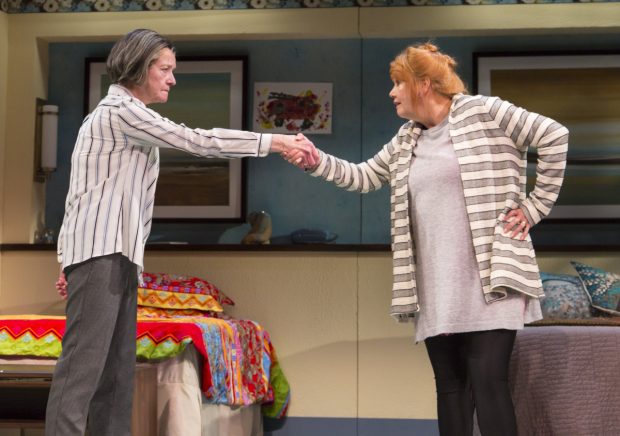Ripcord

(© T. Charles Erickson)
It's hard to understand what David Lindsay-Abaire was thinking when he decided to write a comedy set in a senior living facility. Perhaps he was looking to mine the sentimental vein or comic misunderstandings, but other than absurdist dramas by Samuel Beckett, plays filled with humor at the edge of the grave hover over a dangerous divide.
However, despite tucking the dark edges beneath the one-liner gags, the Huntington Theater-Calderwood Pavilion's production of Lindsay-Abaire's comedy, Ripcord has much to recommend it, chiefly the two actors at the show's center: Nancy E. Carroll as the acerbic Abby, and Annie Golden, as the latter-day flower child, Marilyn.
The Boston-based Carroll is an expert at playing characters who disguise their feelings beneath a walled-off exterior. Golden, a veteran of the Netflix series "Orange Is the New Black" and last summer's premiere musical at Barrington Stage, Broadway Bounty Hunter, has no trouble playing an adorable woman of a certain age, exuding warmth and kindness with a manipulative zing. It's worth the sense of edginess around laughing at their banter to watch these women circling each other for advantage.
The premise of Ripcord is placing the two leading characters in a room together at the Bristol Place Senior Living Facility, which they each now call home. Abby has rights of possession: four years in a double room on her own, by virtue of her snarling nature. No one has been able to stand living with her, thus she scores the prize of a single with privacy. Enter Marilyn, a sunny elder who believes that the glass is always half full, no matter the problems. She asserts that Abby is ideal for her and is perfectly content to remain in the other bed, no matter the frosty, emotional temperature of their shared space.
The other major difference concerns family matters. While both women are widows, Marilyn has an attentive daughter and son-in-law who visit often (the good sports, Laura Latreille and Richard Prioleau). Abby is estranged from her only son. The cast is completed by Scotty (Ugo Chukwu), the cheery health aide who aspires to a career as an actor and a surprise visitor who arrives in Act 2 (played by a contrite Eric T. Miller). The scene between Carroll and Miller is one of the highlights of the show.
The ante is upped by a bet proposed by Marilyn. If she can frighten Abby, who claims that nothing can scare her, Marilyn gets the bed by the window, with a view of the park. If Abby can anger Marilyn, who says that she never gets mad, the cheery roommate will leave for another roommate situation. What follows is a series of pranks and dirty tricks that soon escalate into a gray-haired version of high crimes and misdemeanors, shifting the tone of the play from comedy to creepy melodrama, with an added dollop of fantasy.
Under the direction of Jessica Stone, the design team at the Huntington handles the changing styles with expert ease. Scenic designer Tobin Ost, costume designer Gabriel Berry, lighting designer David Weiner, and sound designer-composer Mark Bennett move the production from the reality of a bland institutional room into another stratosphere (literally). Stone has compounded the detours into dreamland by covering the scene changes with dance sequences by the women, ranging from partnering each other in a tango to a buzzy version of rock and roll.
Given the unspoken knowledge that Abby and Marilyn have landed at the next-to-final destination, their determination to score even the smallest of victories is Lindsay-Abaire's statement about how we go on living, right till the very end.











